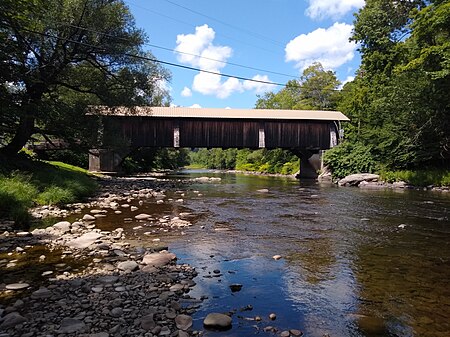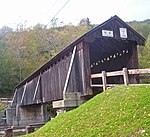Van Tran Flat Bridge
Bridges completed in 1860Bridges in Sullivan County, New YorkCovered bridges in New York (state)Road bridges in New York (state)Tourist attractions in Sullivan County, New York ... and 1 more
Wooden bridges in New York (state)

Van Tran Flat Bridge (also known as the Motts Flats Bridge, the Livingston Manor Covered Bridge, or the Van Tran Bridge) is a wooden, single span covered bridge that crosses Willowemoc Creek in the town of Rockland, in Sullivan County, New York. The bridge was built in 1860 by John Davidson and features a town lattice truss and a laminated arch system. This age makes the Van Tran Flat Bridge the oldest covered bridge in Sullivan County. The bridge was closed and abandoned in 1972, but restoration began in 1984. The Van Tran Flat Bridge is a disputed 117 feet (36 m) in length, and leads to Livingston Manor Covered Bridge County Park.
Excerpt from the Wikipedia article Van Tran Flat Bridge (License: CC BY-SA 3.0, Authors, Images).Van Tran Flat Bridge
Covered Bridge Road,
Geographical coordinates (GPS) Address Nearby Places Show on map
Geographical coordinates (GPS)
| Latitude | Longitude |
|---|---|
| N 41.914444444444 ° | E -74.831388888889 ° |
Address
Covered Bridge Road
12758
New York, United States
Open on Google Maps





